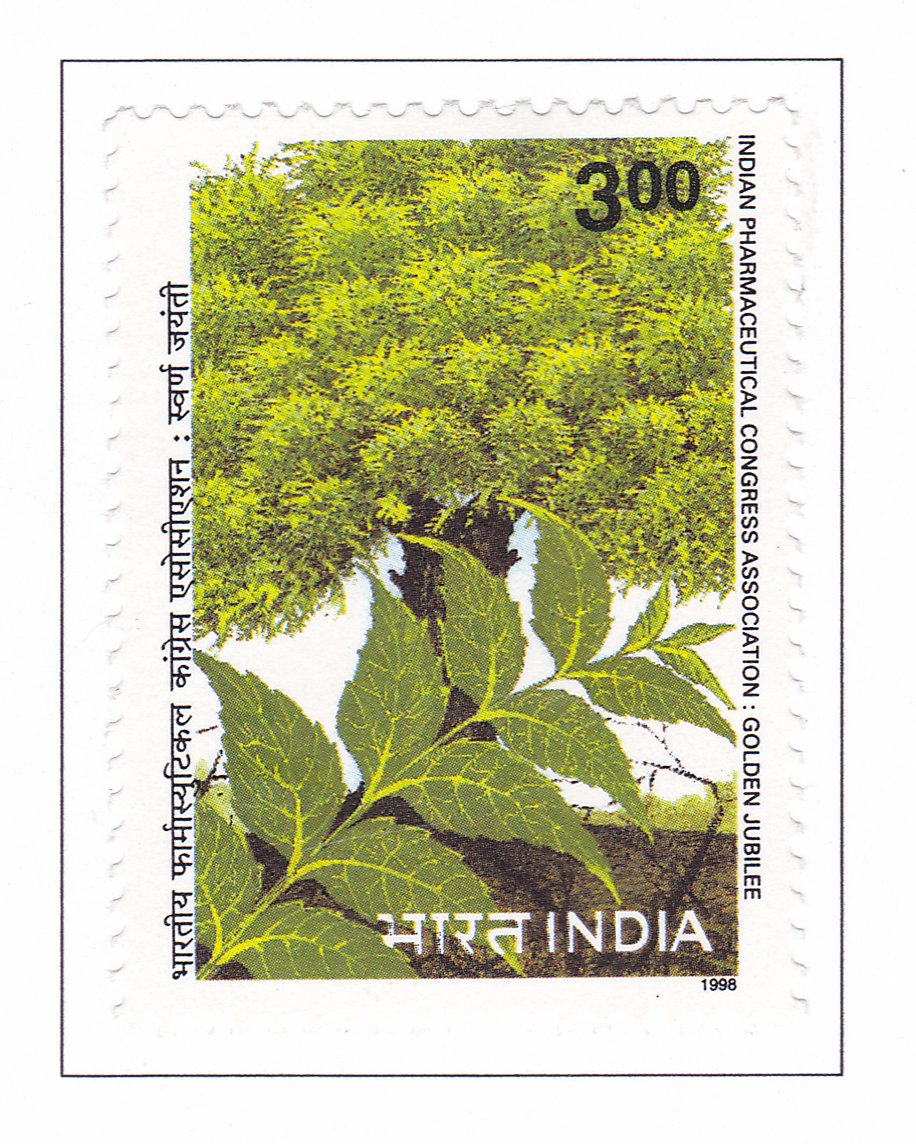The Indian Pharmaceutical Congress

Technical Data
| Stamp Set | Golden Jubliees |
|---|---|
| Date of Issue | December 10, 1998 |
| Denomination | Rs. 3 |
| Quantity | 1,000,000 |
| Perforation | comb 13 x 13½ |
| Printer | Calcutta Security Printers Ltd |
| Watermark | No Watermark |
| Colors | Multicolor |
| Catalog Codes |
Michel IN 1659 Stamp Number IN 1717 Yvert et Tellier IN 1424 Stanley Gibbons IN 1822 |
| Themes | Conferences | Leaves | Medicines | Plants (Flora) | Trees |
Table of Contents
Commemorative Stamp: Golden Jubilee of the Indian Pharmaceutical Congress Association (IPCA)
Design Elements:
- Central Image: The stamp features an artistic representation of the Neem tree, highlighting its significance in traditional Indian medicine and its contemporary relevance in the pharmaceutical industry.
- Background: The design incorporates elements representing the modern pharmaceutical industry, such as tablets and capsules, blending with traditional motifs to reflect the evolution of pharmacy.
- Inscriptions: The stamp includes “Golden Jubilee of the Indian Pharmaceutical Congress Association (IPCA)” and “Healthcare for Humanity – Through Pharmacists” as key text elements.
- Symbolic Elements: The Neem tree, known for its medicinal properties, symbolizes the connection between traditional and modern pharmaceutical practices.
Cultural and Historical Significance:
- Historical Milestone: The stamp commemorates the 50th anniversary of the IPCA, celebrating its role in advancing the pharmaceutical profession and industry in India.
- Traditional Medicine: The Neem tree represents the ancient systems of medicine described in Ayurveda, which laid the foundation for modern pharmaceutical practices.
- Modern Achievements: Highlights India’s significant contributions to the global pharmaceutical industry, including its role as a major producer of tablets and capsules and advancements in blister packing technology.
Usage:
- Postal Circulation: The stamp is used for regular postal services and celebrates the IPCA’s milestone.
- Educational Events: Issued during events related to pharmacy, healthcare, and the pharmaceutical industry, the stamp serves to raise awareness about the contributions of the IPCA and the importance of pharmacy.
- Collectibles: The stamp is a collectible item for philatelists, healthcare professionals, and those interested in the history and development of pharmacy in India.
Example of the Stamp Design:
- Image: The stamp features a detailed depiction of the Neem tree, with its leaves and branches prominently displayed. The background includes imagery of tablets and capsules, reflecting modern pharmaceutical achievements.
- Details: The design includes the IPCA’s 50th anniversary and the theme “Healthcare for Humanity – Through Pharmacists,” showcasing the organization’s impact on both national and international levels.
Significance:
The commemorative stamp set celebrates the 50th anniversary of the IPCA, recognizing its pivotal role in the development and growth of the pharmaceutical profession and industry in India. By highlighting the Neem tree and modern pharmaceutical advancements, the stamp honors both traditional and contemporary contributions to healthcare. The stamp also emphasizes the global significance of the event, particularly with the joint celebration of the 17th Asian Congress by the Federation of Asian Pharmaceutical Associations (FAPA).
Stamp Set Components:
- Series of Stamps: A collection featuring different aspects of the IPCA’s history, achievements, and contributions to the pharmaceutical industry.
- Informative Brochure: A brochure detailing the IPCA’s history, its role in the pharmaceutical industry, and the significance of the Golden Jubilee Congress.
- First Day Covers: Special covers featuring artwork of the Neem tree and imagery related to the pharmaceutical industry, adding to the collectible value of the set.
Educational and Cultural Impact:
The stamp serves as an educational tool to highlight the evolution of pharmacy from traditional medicine to modern practices, celebrating the achievements of the IPCA and its impact on global healthcare.
